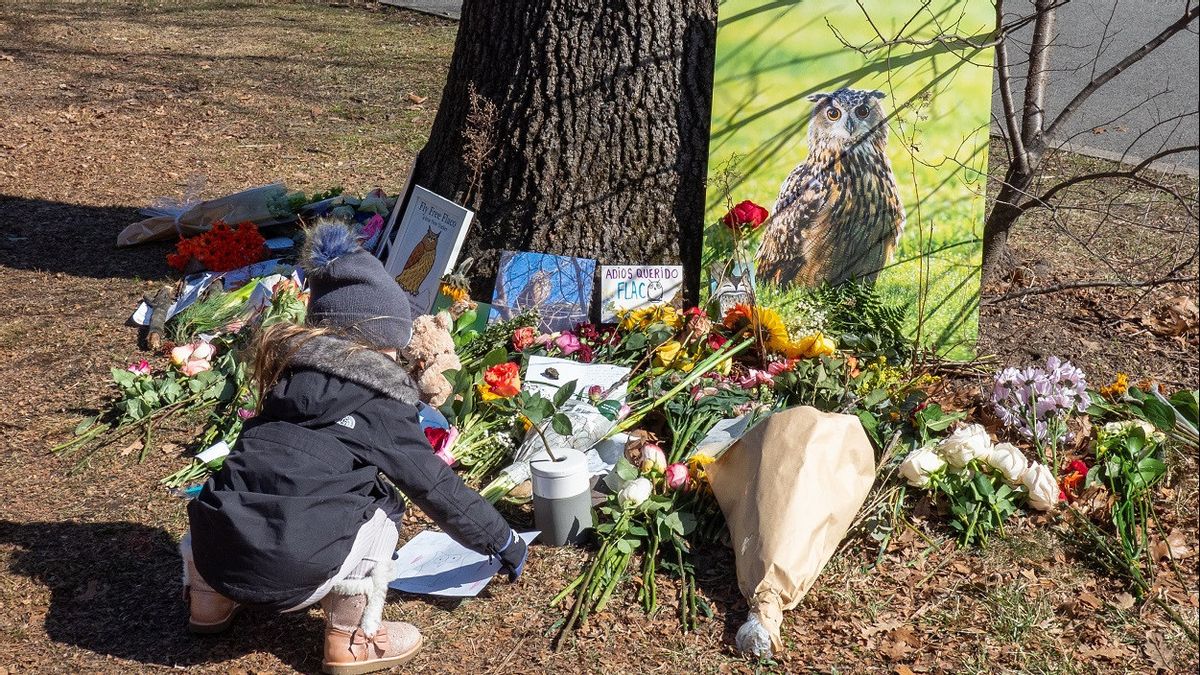JAKARTA - Flaco, an Eurasian eagle owl who in the past year caused New Yorkers to fall in love, was found dead and declared to have suffered acute traumatic injuries, leaving cyberspace residents busy with condolences, while police are also working to investigate the destruction of the owl's cage that caused him to leave the zoo.
Flaco, nicknamed "one of the Most Flying in New York" by New York Mayor Eric Adams, died on Friday two weeks ago after hitting a building in Manhattan, the Wildlife Conservation Society said in its announcement, quoted by CNN on February 1.
In details of the initial post-mortem examination of Flaco, the agency report said he died of an acute traumatic injury based on necropsy results, quoted from the New York Post.
A pathologist at the PIlot Zoo found that Flaco's 4.1-pound body absorbs most of the fatal impacts, although there is "large bleeding under the sternum and in the back of the body's cavity around the liver."
Flaco appears to have avoided head trauma, although there was a'slight bleeding' behind his left eye, the report said.
Based on preliminary findings, none of the owl bones were cracked or broken.
The necropsy results also showed that Flaco was fine before his death, had lost only one or two ounces of weight since his escape, and maintained his health with a good dot and sufficient fat deposit.
Zookeepers initially worried that he might not be able to eat enough to survive, as he grew up in captivity.
Pathologists will now check to see if potential exposure to patrolesicides or other toxins'' or possibly cases of West Nile Virus and Bird Flu contribute to the death of the owl, officials said.
Flaco was staged on March 15, 2010, at theugly Heights Bird Park in Scotland Neck, North Carolina, according to records from the Zoo and Aquarium Association.
He arrived at the Central Park Zoo less than two months later. He was originally placed with snow leopards, snow monkeys, and red pandas. Later, he was transferred to a cage the size of a department store window near the exit of the penguin house.
In the past year, Flaco has lured New Yorkers, after fleeing his home at the Central Park Zoo, due to irresponsible persons who damaged his cage.
Flaco became an attraction at Central Park with the birdsers and others regularly posting the latest news on X about its existence and eating habits.
"The destroyer who damaged the Flaco exhibition endangered the bird's safety and eventually took responsibility for its death," the Wildlife Conservation Society said. "We still hope that thetas (New York Police Department), which investigates vandalism, will eventually make arrests," the agency continued.
Central Park Zoo found Flaco escaping from its cage on February 2, 2023, after someone broke the cage and cut its stainless steel net.
The zoo tried to recapture Flaco with bait and recordings of eagle owl calls. The tricks caught Flaco's interest, but he never liked it, which led the zoo to stop the effort within weeks of the owl's escape.
Flaco has often been seen inside and near Central Park and other locations in Manhattan since, according to the public. Meanwhile, zoo staff are monitoring it throughout the year and preparing to recover it if it shows signs of difficulty or distress.
Like most other owls, it is active at night. Ghosts hunt at night and tend to sleep during the day.
He died on Friday night, after hitting a building on Upper West Side, officials said, quoted by The New York Times.
Wildlife Conservation Society said Flaco was found lying on the ground after hitting a building on West 89th Street.
The occupants of the building contacted the Wild Bird Fund, a rescue organization, whose staff members responded quickly, rescued him and declared he died moments later, the community said.
Federal officials estimate that up to one billion birds in Uncle Sama's country die each year after accidentally flying into the window of the building, quoted by The Guardian.
In October 2020, bird expert Stephen totaled wrote on LinkedIn, there was evidence that light from the windows of city buildings could temporarily blind owls and increase their risk of crashing into buildings, especially at night.
Flaco began pulling the excited fan base as soon as he appeared on the Fifth Avenue pavement the night he fled. He looked out of place, with police officers standing nearby and Bergdorf Goodman not far from there.
"Wow, that was really excited," the 19th Police Station of the New York Police Department wrote on social media at the time.
"We tried to help this little wise bird, but he didn't feel at home with the increasing number of spectators and finally flew."
However, after that Flaco settled in Central Park. As the days passed and he remained free, the question of whether he could survive outside the zoo after a lifetime there turned his suffering into an unexpected story.
When he showed that he was able to survive, he became a happy figure in difficult times, with bird observers, bird experts, and New Yorkers following him directly or, in many cases, tracking his movements online.
Being in an urban area, it is feared that he will hit a building, especially a mirrored building. Other threats include death from Rodentisida poisoning in the mice he ate and fatal collisions with the vehicle.
However, for more than a year, Flaco was shown immune. He was able to avoid vehicles by sticking to the roofs of houses, water towers, and other high building elements after leaving Central Park last fall.
Flaco has lived a comfortable life at the north end of the park, perched on its favorite tree and enjoying food, including the ability to catch rats that have continued to grow since they left the zoo.
He left a relatively safe park around Halloween, embarking on a Manhattan tour that took him to the East Village, Lower East Side, and Upper East Side, delighted the people he met when he appeared on the terrace and air conditioning that resembled the edges of a cliff that used to be a place for the Eurasian eagle's owls.
In December, Flaco mostly settled on Upper West Side, from the 70s to the 90s and from Central Park West tostream Drive, repeatedly returning to certain buildings.
He usually spends his days sleeping on the emergency stairs in the yard, in warmer and less windy places. At dusk, he will fly looking for prey.
One of the sad aspects of Flaco's life in Manhattan is, as a non-native species, he is destined to never find a partner. This doesn't stop him from trying, sometimes screaming in the dark after hours of midnight to build his territory and express interest in breeding.
The last reported sound of Flaco's screams came from a water tower on west 86th Street east of Columbus Avenue at 3 a.m. last Sunday, according to David Barrett's Manhattan Bird Alert account on social media.
The news of Flaco's death made New Yorkers grieve. Not only in the real world, residents are also busy in cyberspace, responding to the news of the excellent death of the winged donna.
Flaco, who will turn 14 this month, was able to get New Yorkers to take to social media X. More than 1,000 users quickly re-uploaded zoo announcements about Flaco's death on X.
While in the real world, adults to children who mourn the death of Flaco, gather at Manhattan Central Park and in 267 W. 89th St., where he died, to express his grief or the death of their beloved owl.
SEE ALSO:
"I am deeply saddened by his death. It is very painful, especially as he has only reached a year in the wild and it seems he is doing very well," said a man who has taken thousands of photos of the free bird.
David Lei, who was with his colleague, TRUEline Emery, has been following and photographing Flaco since his escape, said by email that he and Ms. Emery was sad beyond words, but kept all of our fond memories of him.
The English, Chinese, Japanese, Arabic, and French versions are automatically generated by the AI. So there may still be inaccuracies in translating, please always see Indonesian as our main language. (system supported by DigitalSiber.id)


















